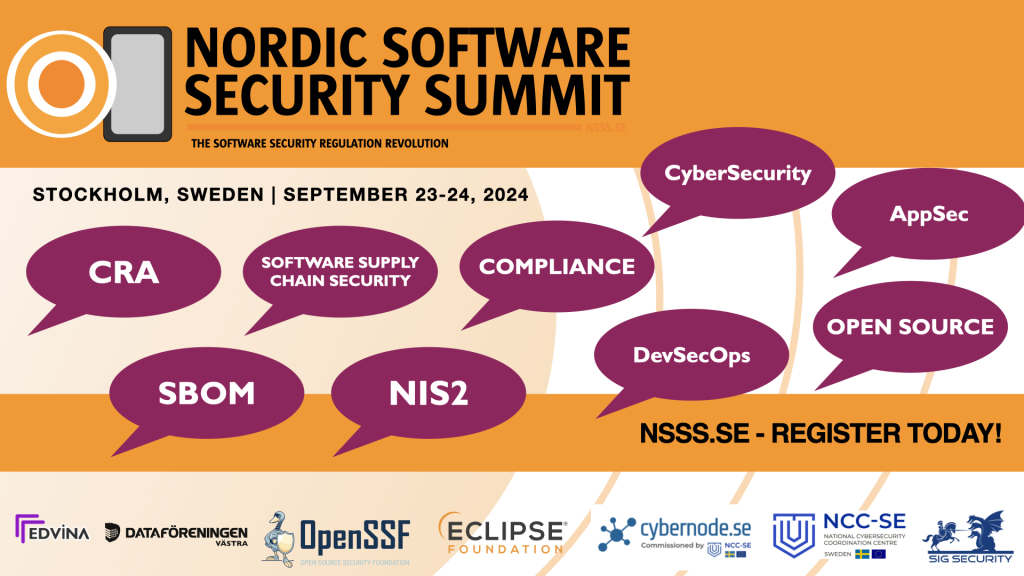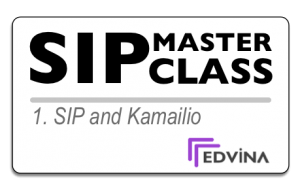Edvina founds SBOMEUROPE.EU with APH10 in the UK

During the fall of 2024 Edvina AB founded SBOM Europe in partnership with APH10 in Manchester, UK.
Europe is undergoing heavy legislation for software, aimed at increasing the application security. One critical part in securing systems and software is the Bill of Materials (BOM). The Software Bill of Materials is in focus around the world as a means to increase software transparency, manage risks and handle license compliance. The SBOM is a versatile tool that already is a critical part of any vulnerability management toolchain.
Olle E. Johansson of Edvina and Anthony Harrison of APH10 are jointly creating webinars, tutorials and trainings. In addition, they are both participating in standards development in OWASP and many other forums.
Learn more on the SBOMEurope Web Site, YouTube Channel and follows us on LinkedIn or BlueSky!
Need to learn more about AppSec in the light of the coming regulation?
The EU Cyber Resilience Act will come into full force in three years from now. That means that software needs to be secure by design and secure by default. Manufacturers will get more responsibility for the cyber security of their customers. In addition, manufacturers will be forced to deliver many years of free security updates. The SBOM is a tool that comes into the limelight in the industry.
Edvina’s founder Olle E. Johansson has been active in Cybernode.se, OWASP SBOM Forum and OWASP CycloneDX working with these issues, as well as taking part in multiple european industry forums that focus on the changes both for the commercial vendors and Open Source projects. During this work, we realised the need for a Nordic forum to learn, discuss and find collegues in the same situation. That’s why we decided to create a new conference.

Edvina organises the Nordic Software Security Summit in Stockholm September 23-24 2024. Visit the web site to read more about the conference and what you can learn during these two days. Partners are OpenSSF, Eclipse Foundation, Cybernode.se, SIG Security, NCC-SE and Dataföreningen Väst.

35 years of Open Networking
Edvina was founded in 1987 and we’ve come a long way since. Today we’re a consulting company working in many areas, with realtime communication and network security as a common theme. Here’s a few examples of projects we’ve been working with during the last five years:
- Building a realtime platform for live radio broadcast
- Training in SIP and Kamailio as well as in TLS and PKI
- Working with Ansible deployment of large scale platforms
- Coding PKI registration and validation authority software in Python, with automated testing in CI/CD chains
- IoT device security and management
- Doorphones
- Call center platforms using SIP, Kamailio and Asterisk
- Emergency call handling platforms
Please do not hesitate to contact us!
Realtime Radio – using SIP in Radio Broadcast
 Edvina has built a custom platform based on the EBU Audio Contribution over IP standards. The platform is used for live broadcast from where the action is – in stadiums, on the road, from events outside the radio house. Using mobile, Internet, satellite and other IP-based connections the journalists can broadcast from anywhere, anytime.
Edvina has built a custom platform based on the EBU Audio Contribution over IP standards. The platform is used for live broadcast from where the action is – in stadiums, on the road, from events outside the radio house. Using mobile, Internet, satellite and other IP-based connections the journalists can broadcast from anywhere, anytime.
Edvina’s Olle E. Johansson will speak about these platforms on the conference Broadcast Radio (R)Evolution 2017 in Stockholm, Sweden May 18 and 19th, organised by Sveriges Radio.
The platform is built using Kamailio – the Open Source SIP server.
Want to learn more? Contact us today!
Learn Kamailio in Madrid – February 2017
 Want to learn how to configure and run Kamailio – the Open Source SIP Server? We are happy to inform you about a public training class together with our friends in Avanzada 7 – February 20-23, 2017! Teacher is Olle E. Johansson, active Kamailio developer, Asterisk developer and active in the SIP Forum and the IETF. The Edvina SIP Masterclass part 1 covers a lot of topics and have a well-proven set of labs to gradually teach you how to operate Kamailio.
Want to learn how to configure and run Kamailio – the Open Source SIP Server? We are happy to inform you about a public training class together with our friends in Avanzada 7 – February 20-23, 2017! Teacher is Olle E. Johansson, active Kamailio developer, Asterisk developer and active in the SIP Forum and the IETF. The Edvina SIP Masterclass part 1 covers a lot of topics and have a well-proven set of labs to gradually teach you how to operate Kamailio.
This class is four days of labs and tutorials. We’re going to go through SIP, which is essential for operating Kamailio, RTP, NAT and much more. SIP over WebSockets with WebRTC is a natural part of the class.
The price is 2.500 Euro ex VAT for four days. If you hurry up and register before the 20th of January you’ll get the Early Bird price of 2.000 Euro ex VAT – a low price for a training with Olle. Contact us today at info@edvina.net to register!
